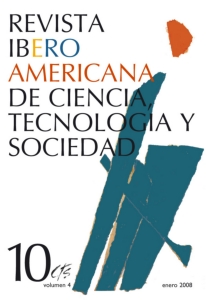Scientific Knowledge, Citizenship, and Democracy
DOI:
https://doi.org/10.52712/issn.1850-0013-916Keywords:
citizen participation, democracy, social appropriation of knowledgeAbstract
Since a few decades ago, the optimism about the benefits of science and technology has been gradually displaced by distrust and suspicion of their possible risks. In parallel, a claim has grown for achieving more fluid and understanding relationships between scientists, citizens and decision-making instances on this matter. This paper addresses the issue, reintroducing the philosophical debate between Dewey and Lippmann on the democracy in the United States and the role that common citizens, leaders, experts and the media should play in it. Picking up these issues may be useful to support the necessity for activating the participative model, not only for reasons of political convenience, but for epistemic and ethical reasons. If new channels are facilitated for a better communication between all the members of a society, and their arguments are taken into account, there will be a better citizen initiative for collaborating in these processes. Thus, we will be able to speak of an authentic social appropriation of scientific knowledge.
Downloads
References
BIJKER, W. E. (s/f): "Democratization of Technology: Who Are the Experts?", disponi-ble en http://www.angelfire.com/la/esst/bijker.html
CARSON, L. y B. MARTIN (2002): "Citizen participation. Random selection of citizens for technological decision making", Science and Public Policy, vol. 29, nº 2.
DAHL, R. (2000): La democracia y sus críticos, Barcelona, Paidós (1989).
DEWEY, J. (1925-1953, 1981-1992): Freedom and Culture. The Later Works, 1925-1953. Ed. Jo Ann Boydsfon (17 vols.), Carbondale, Southern Illinois University Press.
DEWEY, J. (1927): The Public and Its Problems, New York, Holton. (Edición en caste-llano: El público y sus problemas, Buenos Aires, Ágora, 1958).
DEWEY, J. (1939): Logic: The Theory of Inquiry, New York, Henry Holt.
DURANT, J. (1999): "Participatory technology assessment and the democratic model of the public understanding of science", Science and Public Policy, vol. 26, nº 5, pp. 313-319.
EDWARDS, A. (1999): "Scientific expertise and policy-making: the intermediary role of the public sphere", Science and Public Policy, vol. 26, nº 3, pp. 163-170.
FESTENSTEIN, M. (1997): Pragmatism and political theory: from Dewey to Rorty, Chicago, The University of Chicago Press.
FISCHER, F. (1999): "Technological deliberation in a democratic society: the case for participatory inquiry", Science and Public Policy, vol. 26, nº 5, pp. 294-302.
FOURNIAU, J.-M. (2001): "Information, access to decision-making and public debate in France: the growing demand for deliberative democracy", Science and Public Policy, vol. 28, nº 6, pp. 441-451.
HENNEN, L. (1999): "Participatory technology assessment: a response to technical modernity?", Science and Public Policy, vol. 26, nº 5, pp. 303-312.
KUHN, T. S. (1962 [1970 2nd ed.]): The Structure of Scientific Revolutions, Chicago, University of Chicago Press. (Edición en castellano: La estructura de las revoluciones científicas, México, FCE, 1975).
LIPPMANN, W (1925): The phantom public, New York, Harcourt.
LIPPMANN, W. (1945): Public Opinion, New York, Macmillan. Disponible en http://www.gutenberg.org/dirs/etext04/pbpnn10.txt
PUTNAM, H. (1981): Truth, Reason, and History, Cambridge, Cambridge University Press.
RALSTON, S. J. (2004): "Deliberative Democracy as a Matter of Public Spirit: Reconstructing the Dewey-Lippmann Debate", paper presented at the 31st Annual Conference of the Society for the Advancement of American Philosophy.
SÁNCHEZ RON, J. M (2007): El poder de la ciencia, Barcelona, Crítica.
SCLOVE, R. E. (2000): "Town Meetings on Technology. Consensus Conference as Democratic Participation", en D. Lee Kleinman (ed.): Science, Technology & Democracy, New York, State University of New York Press, pp. 33-48.
Downloads
Published
How to Cite
Issue
Section
License
Copyright (c) 2025 CC Attribution 4.0

This work is licensed under a Creative Commons Attribution 4.0 International License.
All CTS's issues and academic articles are under a CC-BY license.
Since 2007, CTS has provided open and free access to all its contents, including the complete archive of its quarterly edition and the different products presented in its electronic platform. This decision is based on the belief that offering free access to published materials helps to build a greater and better exchange of knowledge.
In turn, for the quarterly edition, CTS allows institutional and thematic repositories, as well as personal web pages, to self-archive articles in their post-print or editorial version, immediately after the publication of the final version of each issue and under the condition that a link to the original source will be incorporated into the self-archive.











